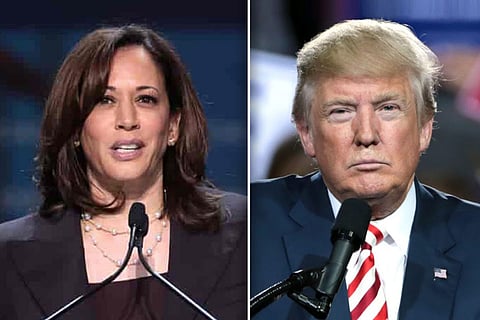

It looks like the star participant of Indian Prime Minister Narendra Modi’s 2019 Houston overture may have tried too hard, but in vain: Indian-Americans seem all set to give Donald Trump a hard pass in the upcoming November 3 presidential election while the vice presidential candidacy of Kamala Harris has galvanized the Indian-American Democratic base, according to a brand new study by the Carnegie Endowment for International Peace. The study, the Indian American Attitudes Survey, was conducted between September 1 and September 20, 2020, in partnership with YouGov, a data analytics firm.
Only 22 percent of Indian-Americans intended to vote for Donald Trump, as against 72 percent for Democratic candidate Joe Biden, a key finding states. The study is the first of its kind to establish an empirical footing for Indian-American political attitudes, “a woefully under-studied” aspect, despite the rising clout of diasporic Indians in the political, economic, and cultural landscapes of the United States. The online survey, which polled 936 Indian-American citizens, both naturalized and US-born, has a nominal overall margin of error of +/- 3.2 per cent.
While noting that Indian-Americans comprise slightly more than one percent if the total US population—and less than one percent of all registered voters—the study draws particular attention to the fact that “the apparent courtship between Donald Trump and Indian Prime Minister Narendra Modi” has not had the anticipated effect of pulling Indian-Americans away from the Democratic party. Also, the much hyped improvement in US-India relations, as a result of the bonhomie between the two leaders, ranks lower in the priorities of Indian-Americans who are more engaged with local issues such as healthcare and economy.
While the Indian-American population grew by 150 percent between 2000 and 2018, the ‘model minority’ community has been a prime target for the two political campaigns. This could prove a vital determinant of electoral outcomes since, as the study notes, “in select swing states, the Indian-American population is larger than the margin of victory that separated Hillary Clinton from Donald Trump in the 2016 presidential elections.”
The community, however, has not been spared the extreme polarization of political views that has become the single animating issue of the 2020 elections. Republican and Democratic voters hold markedly negative views of the candidates from the opposing party and harbor “divergent” views of hot button political issues like immigration and law enforcement.
Interestingly, the issues which cause Indian-Americans to distrust the Republican party are also issues that have caused gigantic fissures in motherland India: the treatment of minorities and the unholy nexus between religion and politics. Though the study does not explicitly state what Indian-Americans think about the latter—or even whether they think the issues are contextually different in the case of India and the United States—its findings conclusively prove that Indian-Americans are rejecting the US version of right-wing politics.